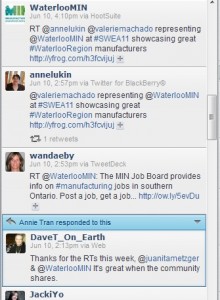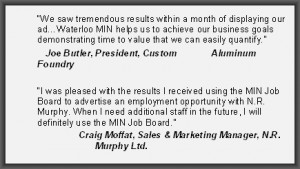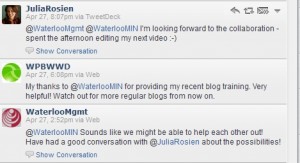Marketing the virtual to manufacturers in Waterloo Region
After the catastrophic economic crash of 2009, the government stepped in to help car companies rebuild themselves. But many manufacturers watched their businesses die and their employees left jobless and many homeless.
 Waterloo Region (in Ontario, Canada) created a network to support struggling manufacturers and help them remain competitive in the new global landscape – the Manufacturing Innovation Network (MIN). The network is free to manufacturers and supported by the local governments and corporate sponsors connected to the manufacturing community. It shortens the supply chain, provides quick access to jobs/laborers, delivers expert advice and provides an online space to collaborate.
Waterloo Region (in Ontario, Canada) created a network to support struggling manufacturers and help them remain competitive in the new global landscape – the Manufacturing Innovation Network (MIN). The network is free to manufacturers and supported by the local governments and corporate sponsors connected to the manufacturing community. It shortens the supply chain, provides quick access to jobs/laborers, delivers expert advice and provides an online space to collaborate.
The MIN has grown since 2009 to include over a thousand manufacturers and their employees.
Manufacturing and innovation
This year marks a turning point for the MIN as it turns to social media to amplify the message and create deeper connections between manufacturers, service providers and other manufacturing networks. As the MIN’s social media strategist, I’m eager to grow this network to help keep manufacturing in North America.
 Why is it important to keep manufacturing in North America? The simple answer is jobs – it’s a no-brainer. But it goes deeper than that. When factories, disappear so does innovation. When we’re no longer connected to the things we make, we forget how the inner workings affect design and end-user performance. From the New York Times: “The big debate today is whether we can continue to be competitive in R&D when we are not making the stuff that we innovate.”
Why is it important to keep manufacturing in North America? The simple answer is jobs – it’s a no-brainer. But it goes deeper than that. When factories, disappear so does innovation. When we’re no longer connected to the things we make, we forget how the inner workings affect design and end-user performance. From the New York Times: “The big debate today is whether we can continue to be competitive in R&D when we are not making the stuff that we innovate.”
Waterloo Region may be Canada’s Silicon Valley, but it’s also a hotbed of manufacturing – both traditional and advanced. Connecting manufacturers locally empowers them with a lean manufacturing model. When a manufacturer sources a widget from a company across town (instead of off-shore), the benefits to local businesses and residents are endless:
- Cost of the finished product is reduced, making it more competitive to those sourced off-shore.
- Timelines are shortened, making final delivery quicker.
- Local jobs are protected, which reduces the need for government services to support the unemployed workforce.
- The local economic community is strengthened as dollars made here are spent here
Marketing to manufacturers
Marketing an online meeting space to manufacturers can sometimes feel like feeding steak to a vegetarian. But within that mindset of produce and deliver as quickly as possible, there are a handful of thought leaders who understand the power of the online landscape.
When I joined the Manufacturing Innovation Network in 2010, it was clear we needed to question past strategies and experiment with new tactics. To affect a cultural shift this size, it’s important to listen to manufacturing needs and concerns and guide change with a gentle hand.
![]() Raising the visibility of the MIN locally and online was top priority.
Raising the visibility of the MIN locally and online was top priority.
- We connected with local people on Twitter, LinkedIn and Facebook – sharing local events and concerns. Our conversations helped the community how the value the MIN placed in supporting a multitude of local efforts – not just manufacturing.
- We connected with manufacturers and other manufacturing networks across North America, sharing newsworthy items and helpful information.
- We attended public face-to-face events, such as TEDx and the Social Media Breakfast.
- We coordinated face-to-face networking events, such as our anniversary party and events designed for our niche communities – like our solar panel manufacturers.
 We also ramped up our blogging program, supporting our local experts by giving them a bigger stage on which to share their information. We connected them online through our social networks but we also held face-to-face events to strengthen those bonds.
We also ramped up our blogging program, supporting our local experts by giving them a bigger stage on which to share their information. We connected them online through our social networks but we also held face-to-face events to strengthen those bonds.
The MIN is growing fast and the social connecting online is starting to change the face of manufacturing in Waterloo Region. Our video campaign on YouTube gives manufacturers as place to share their innovation and reach an audience unfamiliar with their work.
- The Sign Depot – Custom manufacturing is rare breed, but the Sign Depot is actively using Twitter to open communication with people and companies they haven’t done business with before. Follow them on Twitter – this is one manufacturer that gets it.
- Kuntz Electroplating – Traditional manufacturing took a serious hit and with 40% reduction in staff. They’re keeping their operation lean and using automation instead of off-shore sourcing to remain competitive. And it’s working – they’re the largest supplier to Harley Davidson and a major supplier to BMW and Mercedes Benz.
- Photowatt Ontario – Producing solar panels is considered advanced manufacturing and it may be the best thing to arrive in Waterloo Region since RIM and their Blackberry. Photowatt is just one example of this burgeoning market.
 The MIN is a case study in social media and like any case study, it’s a living, evolving thing. As more manufacturers learn to use social media and network online, the community will grow. As more leaders step up to blog on the MIN, manufacturers will have a go-to place for best practices and innovative ideas. But most importantly, the MIN is now poised to serve those companies that need it most.
The MIN is a case study in social media and like any case study, it’s a living, evolving thing. As more manufacturers learn to use social media and network online, the community will grow. As more leaders step up to blog on the MIN, manufacturers will have a go-to place for best practices and innovative ideas. But most importantly, the MIN is now poised to serve those companies that need it most.
Have you ever worked with a not-for-profit network, such as the MIN? How did your network evolve over time?
Got social media questions? Follow me on Twitter, friend me on Facebook or connect with me on LinkedIn – I’m always on.


Excellent article on the ongoing evolution of MIN! Thanks Julia!
Thanks so much, Val! It’s an honor to work with such innovative group!
Julia